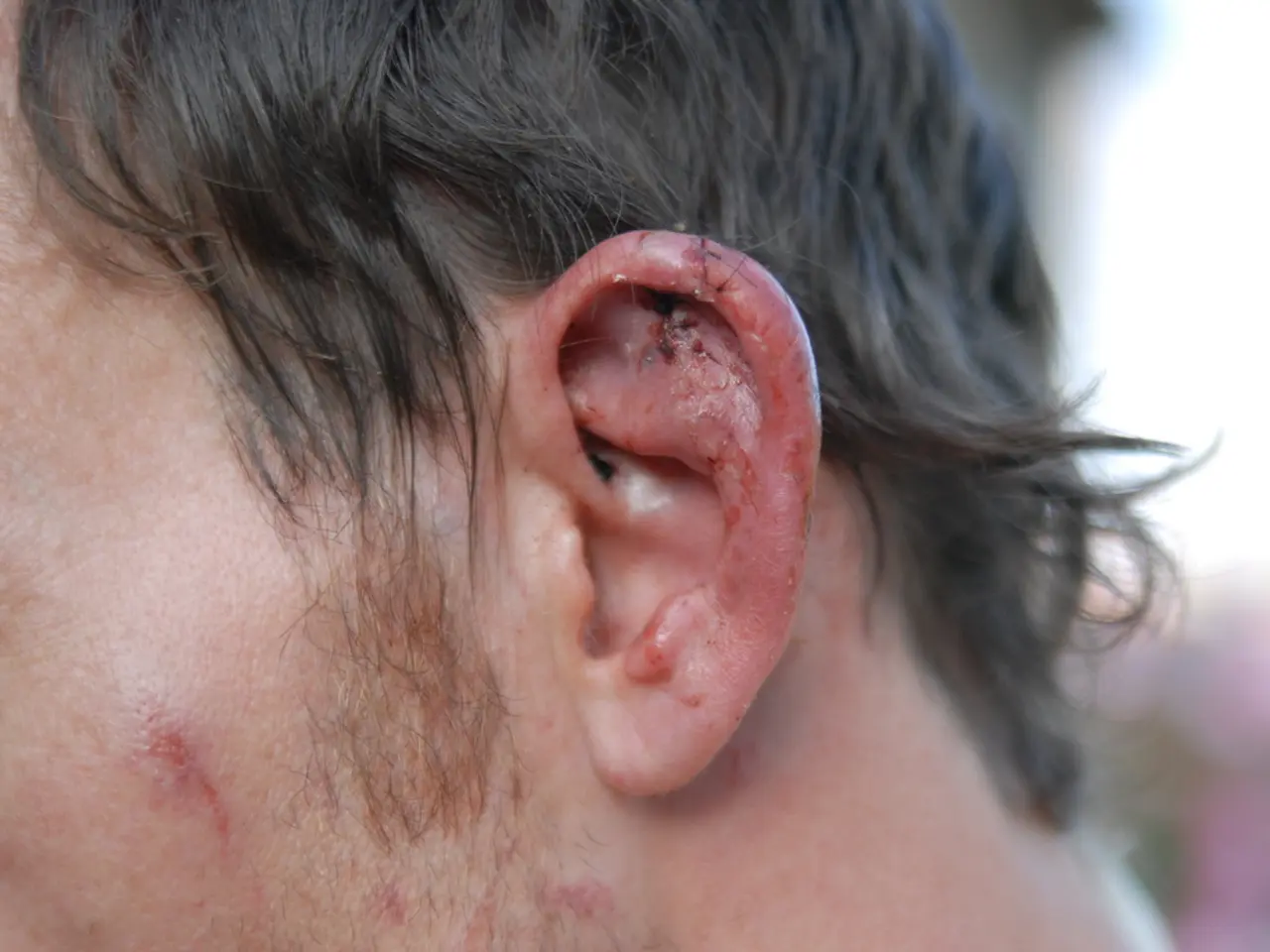Odor originating from behind ears: Explanation of potential sources
A persistent bad smell behind the ears can be a cause for concern, but understanding its common causes and effective prevention methods can help maintain good hygiene and overall health.
Most often, the culprit behind this odour is the accumulation of bacteria, yeast, or fungi in the area. Factors such as oily skin and product buildup, moisture, poor hygiene, and certain skin conditions like seborrheic dermatitis or eczema can contribute to this issue.
To prevent odour, regular and gentle cleansing with mild soap and warm water, thorough drying after washing or swimming, reducing product use, maintaining good hygiene, and considering natural remedies like diluted apple cider vinegar can be effective strategies. It's essential to avoid scratching or picking at the skin behind the ears, as this can introduce bacteria and damage the skin barrier.
If a persistent or strong odour has already developed, topical antibacterial or antifungal agents may be recommended for mild infections. However, if the odour is accompanied by redness, swelling, pain, or discharge, it's crucial to consult a healthcare provider for possible infection or underlying skin condition. In severe cases, a doctor may prescribe topical or oral medications to treat underlying bacterial or fungal infections.
Diluted apple cider vinegar or mild antiseptic wipes can be used cautiously for spot cleaning, but it's important to avoid excessive use as this can irritate the skin.
Yeast infections, caused by the fungus Candida albicans, can also cause a bad smell behind the ears, particularly in warm and moist areas. While most yeast infections respond well to over-the-counter antifungal remedies, severe infections or those affecting people with weak immune systems may require prescription medication.
Seborrheic dermatitis, a type of eczema, can also affect the area behind the ears, causing flaky, scaly skin. Discussing unusual smells in the body with a healthcare professional is always important, as they can offer reassurance and help find the right treatment.
Infected ear piercings can also cause a bad smell due to pus, dead skin, and other drainage from the infection. Infected injuries behind the ear may require antibiotics, while cleaning the area with rubbing alcohol or a special ear piercing solution might help.
Otomycosis, an infection of the inside of the ear, usually in the outermost part, should be seen by a doctor if it becomes invasive, spreading deep into the ear or even into the bone, and requires prescription medication for treatment.
In summary, maintaining good hygiene and keeping the area behind the ears clean and dry are the most effective ways to prevent odour. If symptoms persist or worsen, seeking medical advice is essential.
- The accumulation of bacteria, yeast, or fungi is commonly the source of the odor behind the ears.
- Oily skin and product buildup, moisture, poor hygiene, and certain skin conditions like seborrheic dermatitis or eczema are contributing factors to this issue.
- For prevention, regular and gentle cleansing with mild soap and warm water, thorough drying after washing or swimming, reducing product use, and maintaining good hygiene are recommended strategies.
- Natural remedies like diluted apple cider vinegar can be effective in prevention, but excessive use should be avoided as it may irritate the skin.
- If a persistent or strong odor has developed, topical antibacterial or antifungal agents may be necessary for mild infections.
- If the odor is accompanied by redness, swelling, pain, or discharge, it's important to consult a healthcare provider for potential infection or an underlying skin condition.
- Severe infections or those affecting people with weak immune systems may require prescription medication for yeast infections.
- Seborrheic dermatitis, a type of eczema, can cause flaky, scaly skin behind the ears, and discussing unusual smells in the body with a healthcare professional is important.
- Infected ear piercings can cause a bad smell due to pus, dead skin, and drainage from the infection, and may require antibiotics for treatment.
- Infected injuries behind the ear may also need antibiotics, while cleaning the area with rubbing alcohol or a special ear piercing solution might be helpful.
- Otomycosis, an infection of the inside of the ear, should be treated by a doctor if it becomes invasive, spreading deep into the ear or even into the bone, and requires prescription medication for treatment.
- It's crucial to avoid scratching or picking at the skin behind the ears, as this can introduce bacteria and damage the skin barrier.
- In summary, health-and-wellness practices, mental-health awareness, skin-care routines, therapies-and-treatments, and proper nutrition are vital for overall health and hygiene.
- If symptoms persist or worsen, seeking medical advice and following predictive models in science is essential for early detection and effective treatment of various health conditions, such as atopic dermatitis, HIV, arthritis, psoriasis, and migraines.




